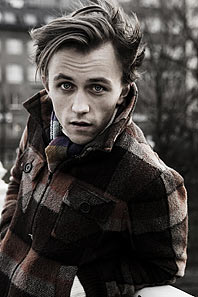
Sondre Lerche (SAHN-druh LAIR-kay) is honest when asked about his Best New Artist Norwegian Grammy win. “I’m still bummed out I didn’t get Pop Album of the Year,” he admits. Who won? “You wouldn’t know him. He doesn’t have an international career.” Needless to add “Unlike me.” The elfin 23-year-old is a rising indie star in the U.S., playing to packed houses at venues like the Bowery Ballroom. He began performing at 14, and by the time he was 19, his album Faces Down had gone gold in Norway. There was nothing teenybopper about it; it was mature pop, catchy but sophisticated, in the Serge Gainsbourg mode. In 2002, Lerche was opening for local heroes A-Ha in front of 25,000 screaming Norwegians. But fame in such a small place finally drove him out. “I had to get away from Norway, from being Sondre Lerche, and just be Sondre Lerche. Or, well, just Sondre. I was always so self-aware all the time.”
So he emigrated to Williamsburg, that haven for would-be artists and musicians and those who would like to be mistaken for them, but didn’t find the anonymity he was counting on. “I couldn’t believe how many people recognized me there,” he explains. “They’re obviously really into arts and music, and I probably didn’t embrace that as much as I could have.” So he traded in his Brooklyn pad for an apartment on Bleecker Street, which he finds much more to his liking. “It has a backyard. Have you seen Rear Window? It reminds me of that. And it’s just what I needed. I really came here to be inside and shut the door and really just make music for a couple of months.”
Blissfully unrecognized in his new neighborhood, he’s taking time between albums to acquaint himself with New York, developing a dislike of the subway and getting used to some of our city’s ignoble traditions: “There was this fantastic Italian restaurant I used to love called Figa. And now that I’ve moved here, it’s gone! I was just here in January and the whole room was taken apart and there was a sign that said back soon. But they’d had this big mural of Sophia Loren on the wall, and when I looked inside it was gone, so I knew they were really closed. I was so sad.”
Having mastered the art of crafting pop songs with simple, unpredictable melodies, Lerche also demonstrates a much rarer knack for writing whimsical lyrics that gracefully toe the line between earnest and opaque (“Oh, what a world this life would be / Forget all your Technicolor dreams / Forget modern nature / This is how it’s meant to be”). He delivers such sentiments in an endearingly wistful tone and is capable of astonishing vocal gymnastics and emotional range. OnFaces Down, he sounded as mournful as Elliott Smith on one song, while swinging and snapping his fingers like Tom Jones on the next. You can practically see him sashaying across the stage at the Carlyle. Given all that, he can be forgiven the occasional klutzy metaphor, like when he compares tears to pretzels. English, after all, is his second language.
On his brand-new album, Duper Sessions (a side project, technically, which he co-wrote with his pianist, Erik Halvorsen, and recorded live in the studio), he runs with a jazzier, retro sound that, he says, takes him back to his roots. “Cole Porter is kind of my inspiration—he’s how I got into this whole style of music. He got me into music a 9-year-old wouldn’t normally have been into.” The songs are romantic and sentimental with a pleasantly loungey vibe. His mellow originals blend nicely with daring covers such as Porter’s “Night and Day” (“The prettiest melody I’d ever heard”) and Elvis Costello’s plaintive “Human Hands.”
With a limited tour just wrapping up, Lerche’s begun work on his next album, which promises a return to the pop sensibility of his earlier material, although he describes the sound as “punchier and more energetic, with a bit of screaming.” For his growing American fan base—whom he humbly pegs as “music nerds like myself, a lot of girls, and a lot of Burt Bacharach fans”—the next one could be the one that gets him stalked on Bleecker Street. But if it happens, it won’t be from pandering to the eighties-worshipping masses. “That’s the deal with trends: Everything is blown out of proportion,” he explains. “One musical sound may seem like the most genuine thing you’ve ever heard at the moment, but it’s actually the stupidest thing in the world. I’m happy not to play too much of a part in that.”
Duper Sessions
Sondre Lerche and
the Faces Down Quartet. AstralWerks.